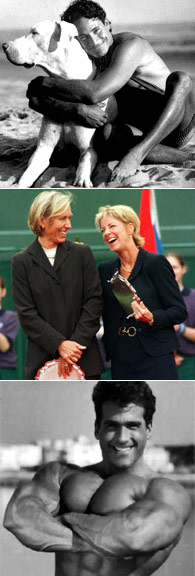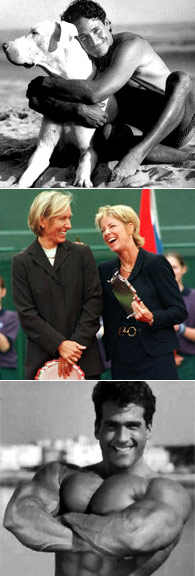In a world that often associates "gay-ness" with frivolity and all-night clubbing, gay sportsmen and women stand out like beacons of contradiction. Indeed, it can be hard sometimes to imagine athletes from the hurly burly world of sports jiving down to the latest of strains of Kylie Minogue in trendy clubs like the rest of us.

From the top: Greg Louganis, Martina Navratilova (left) with Chris Evert and Bob Paris.
In recent years, no other athlete has captivated the gay world's imagination as much as Greg Louganis, diver and winner of four Olympic gold medals. The fact that he was the living embodiment of Michelangelo's David was only part of his appeal. In his 1995 autobiography Breaking the Surface, we learned how, apart from his homosexuality, Greg also suffered racial discrimination (due to his Samoan background), mental abuse from a hard-driving father and even rape from an abusive ex-lover.
It is therefore remarkable that he managed to triumph over all adversity through sheer willpower and discipline, and emerged a true champion in every sense of the word. This champion quality was best seen in the 1988 Seoul Olympics when he clinched the gold medal even after cracking his head on the diving board. Though he is now coping with the spectre of Aids, there is no doubt he will deal with it with the dignity he had displayed throughout his career.
Another "out" sportsperson, this time in the field of tennis, is Martina Navratilova. Bestowed with the arms of Hercules, she ruled women's tennis from the late 1970s to the early 1990s, battling the likes of Chris Evert and Steffi Graf. Off court, she had her fair share of infamy - her relationship with a divorced woman and their subsequent falling out were all played out in the public eye.
Still, she was best remembered for her incredible athleticism and fluid playing style which snared her a record 167 singles titles. Her recent forays back into competitive tennis in doubles at the age of 42 grabbed her some headlines but it was clear to all that her best days were over.
My personal favourite sportsman is Bob Paris, the bodybuilder (not an indication of my taste in men). Though there were occasional rumbles over whether posing and preening constitutes sport, I personally never thought the distinction was crucial. After all, the amount of training and discipline required for competitive bodybuilding is equal to any other sport. More so, some would say. Never mind that the spectators were probably the only ones getting all hot and bothered during actual competition.
Like Greg, Bob also catapulted out of the closet a while back with revelations in Ironman, a muscle magazine, followed by an interview with Oprah Winfrey and a tell-all book he "co-authored" with then soul-mate Rod Jackson (whom he subsequently "married" and "divorced"). Though his achievements paled in comparison to Greg's or Martina's (having won only Mr America and Mr Universe once each in 1983), he did manage to stay in the limelight for the requisite 15 minutes. This is perhaps due to his uncanny ability for self-promotion or for just being a plain nice guy. Or it could be attributed to the sexy Herb Ritts black and white photos he took with Rod.
There are of course many others whom we could not discuss here for lack of space, from Bill Tilden (Wimbledon and US Open Champion in the 1920s) to Rudy Galindo (flamboyant American ice-skater). And there are also the countless gay sportsmen and women who have chosen to remain firmly closeted. Of course, this has not prevented allegations from surfacing every now and then. The most recent example would be Ian Thorpe, the Australian torpedo of the swimming lanes. Perhaps the size of his feet have sparked off intense speculation about his other more interesting body parts and things just went downhill from there.

From the top: Greg Louganis, Martina Navratilova (left) with Chris Evert and Bob Paris.
So apart from looking good and disgustingly healthy, and starring in many of our fantasies and daydreams, are these gay sportsmen and women of any other value to our life? I think the answer is a resounding yes.
As mentioned earlier, the predominant characteristics of gay culture have been largely hedonistic. Even those working out in gyms often do it in pursuit of the body beautiful which in turn translates into getting more sex. The idea of training for ideals that do not involve admiring looks or sex may seem strange, alien even. So to see a gay athlete doing well or performing with the grace and skill that come with years of training can be hugely refreshing.
We already know that sportsmen are inspiring in general for their commitment and discipline in sticking to training regimes that are often beyond the comprehension of people whose only exercise is lifting forks and spoons.
On top of that, gay sportsmen and women are great role models, and not just for those who are mired in their gay selves - even well-balanced, openly gay individuals can be inspired by the examples set by some of these individuals. We have seen that sports can also offer solace to many a gay athlete as it imbues a sense of power and achievement like no other activity. And in an increasingly tolerant world, should more gay athletes come forth to share their inspirational lives with us, the positive impact on the gay community would be considerable.
This could only be extremely beneficial in the long run as we all need heroes. As a start, gay athletes paint a portrait of normalcy. Putting aside the minefield of arguments about what constitutes normalcy, it is comforting to see that it is possible to be every bit as macho or competent as the next straight competitor without one's sexual orientation clouding up the issue.
More importantly, gay athletes provide role models for gay men and women everywhere. For instance, when we saw Martina lifting the Venus Rosewater Dish up for a record 9th time at Wimbledon, chances are we will identify with her more than we ever would with Steffi. And with gay sportsmen and women as role models, we may find within us the inspiration and self-empowerment to be heroes and role models ourselves.











 打印版本
打印版本










读者回应
抢先发表第一个回应吧!
请先登入再使用此功能。